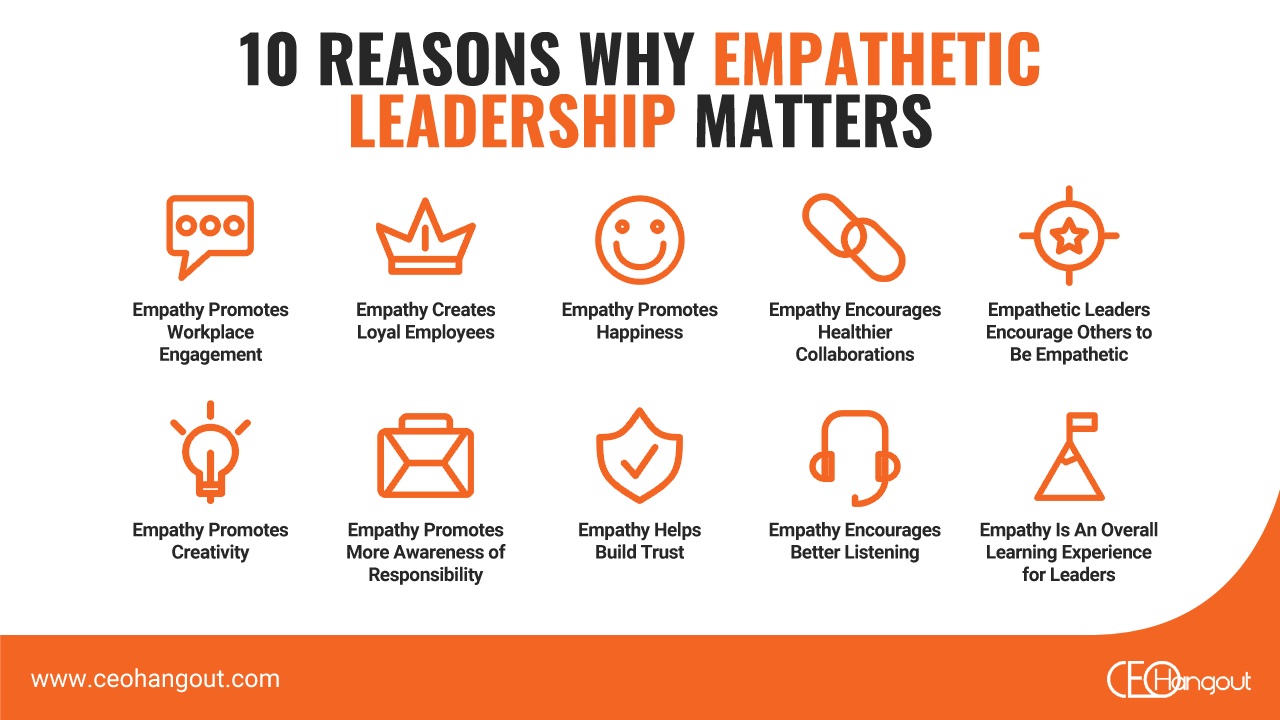Believe it or not, most people believe that the best way to become a successful leader is to exhibit the highest IQ, or at least, appear emotionless and analytical in the face of their workforce.
Empathy will most likely won’t get a look because that might exhibit “weakness” in the workplace. In other words, the less emotion one has, the more successful he will be.
But the truth is, if you want your staff to be happier and more productive, then practicing empathy is the way to go. In fact, the best leaders are the complete opposite of emotionless and analytical. Instead, they’re empathetic, compassionate, highly sensitive, and have high emotional intelligence.

With that said, here are 10 reasons why empathetic leadership matters:
1. Empathy Promotes Workplace Engagement
Nothing beats that feeling of being appreciated for your work.
That’s how your staff wants to feel whenever their work is appreciated by you. And, whenever they feel that way, they’ll automatically be willing to do more for you.
So, when it comes to employee engagement, leadership must demonstrate how much they care about their workers so that the reaction is positive. When the reaction is positive, staff members are more willing to engage within the workplace and make things happen. And while some organizations tend to miss this must-have attitude, it doesn’t have to be that way.
Take it from organizations that have been successful in bringing empathy into their mission to notice, praise, and find ways to show employee appreciation.
Speaking of employees…
2. Empathy Creates Loyal Employees
Employees are more likely to be loyal to their company, whenever supervision exhibits more empathy towards them.
In fact, one of the main struggles that every organization faces is being too focused on retaining talented staff, rather than being empathetic. This can only result in staff members resenting their supervisors and managers, and eventually resenting their job – much to the point where they seek other employment for a better work environment.
Therefore, leaders must express empathy to ensure that employees are appreciated, and the staff will be more likely to stay loyal to supervision. So, remember: Employees want to be heard, appreciated, and cared about – the main ingredients that create a loyal staff.
3. Empathy Promotes Happiness
As leadership shows empathy toward their staff, there will soon be a realm of happiness.
Think: a happy work environment makes a happy staff. Whenever the staff members are seen, heard, and appreciated, they’re less likely to purposefully miss days at work, and more likely to stick around.
In other words, as the level of job satisfaction increases with empathy, staff will be more motivated to work and do a good job. Besides, who doesn’t want to be happy at their job?
4. Empathy Encourages Healthier Collaborations
With empathy, employees are more likely to be comfortable working with each other. Yes, not only will employees be willing to work as a team, but they’ll also look forward to it. Plus, not only do employees that feel valued and appreciated by supervision want to do more in their work, but they’ll also want to do more for their coworkers.
But again, empathetic practices start with leadership. When leadership exhibits empathy to the workforce, employees will see it and want to copy it. In fact, many organizations are now training staff members to practice empathy to ensure a healthy work environment. When empathy is demonstrated at the top, it’s passed down throughout the organization, resulting in the following:
- Increased and encouraged teamwork
- Increased productivity
- Decreases in staff conflict, AND
- A less likelihood of workplace disruption
5. Empathetic Leaders Encourage Others To Be Empathetic
As mentioned before, organizations are now encouraging their staff through training that empathy is the way to go. With empathy being encouraged more often, even in the changing times of diversity and inclusion, it’s now more important than ever for the workforce to demonstrate empathy themselves.
In hindsight, empathy, like respect, is considered a two-way street. While the higher-ups must exhibit appreciation and consideration for their staff, the staff members must show the same empathy for the higher-ups and each other.
Plus, empathy is built into humans, meaning that it’s a natural part of the human condition, or the ability to exhibit behaviors to those around them. In that case, empathy must be demonstrated to people around you, not negative behaviors and actions. Empathy includes verbal and non-verbal cues and gestures that can make people feel good, and not intimidated. So, when taking into account the human condition aspect of things, leaders must do the following:
- Understand the inner purpose that drives each of your employees, and align that purpose with your organization’s goals.
- Be more open to the workforce about any ideas, and then get as much feedback from employees as possible.
- Allow employees to describe how the workforce can improve, and what’s working for them so far.
6. Empathy Promotes Creativity
Creativity should be the main staple of an organization, since it allows staff to share ideas, create, and work together to reach a certain goal. In fact, some employees will go as far as looking for more innovative ways to improve their work environment and add more value to the organization. Why is that? People who want to feel like they’re a part of an organization tend to risk more by looking for ways to incorporate creativity.
With empathy, creativity can come alive. In other words, employees will be more likely to do the following:
- Put time and effort into coming up with new ideas, processes, and methods
- Be willing to help improve their own work, and the organization in general, AND
- Have more of a desire to create and improve for many years to come
7. Empathy Promotes More Awareness Of Responsibility
The truth is, when a leader decides to be more empathetic to his or her organization, they’ll start to see responsibilities more clearly – this is something that many leaders miss out on. However, when you instill a sense of empathy now, you’ll soon see what your responsibilities are, and what you can do to ensure that your staff is cared for.
With responsibilities in mind, implementing empathy in the work environment comes with the following advantages:
- Empathy allows staff to feel safe with any possible failures because they’re assured that supervision won’t scold them for something trivial.
- It encourages leaders to fully understand the root cause behind the poor performance, rather than make vague assumptions.
- Empathetic leaders are more likely to help struggling employees improve and excel.
- Empathetic leaders help build and develop relationships with their workforce.
8. Empathy Helps Build Trust
As mentioned before, showing empathy to your workforce will make them more likely to be loyal to you. And, with loyalty comes trust. With trust, there are tangible benefits that come from it:
- Leaders can understand what those around us need, rather than what they perceive is required.
- Leaders who take the time to understand the needs of their employees can provide them with as much support as they need in order to move forward at work. AND,
- Leaders who are empathetic are more likely to be trusted in hearing about the challenges or issues that might be holding employees back from achieving their goals.
9. Empathy Encourages Better Listening
Believe it or not, an empathetic leader listens to others. You must want to listen, in order for employees to trust that their leader is someone to look up to. When a leader listens to feedback, concerns, etc. that shows empathy.
In general, empathetic people tend to listen attentively to what others are telling them, having them completely focus on the person in front of them, and not succumbing to tedious distractions. In fact, empathetic people have that strong desire to listen, because they want to hear and understand the difficulties that others face. As a result, when the leader listens, employees will trust them and be more loyal to them.
10. Empathy Is An Overall Learning Experience For Leaders
Finally, empathy must be one of the pillars that make the moral foundation of an organization. That means a successful leader must learn empathy before implementing it. Whether it’s through leadership training or experiences in lower positions, a leader must know what empathy is by the time they reach the top. Here are some ways empathy can help you to become a better leader for your organization:
- Empathy helps you gain a greater awareness of your staff’s needs.
- Empathy lets you create an environment of open communication.
- Empathy allows you to understand and explore problems that employees might face and allows you to see how you can help them resolve them.
- Empathy even helps you validate what your staff is going through.

Additional resource: Discover why empathetic leadership matters and how it reflects in your business's landing page.
Conclusion
So, as you can see, empathy is a key trait to have when you’re a leader of an organization. No one wants to work for a soulless entity; so, why not change that by showing empathy? As you show empathy to your employees, then they’re more likely to show high commitment to your cause, along with more cooperation in the workplace.
As you keep in mind these 10 reasons, we encourage you to take advantage of our helpful points on empathy. And, we hope that you can find it in your heart to transform your organization for the better by implementing empathy in your leadership practices.
Additional resource: Master your mind and defy the odds with ‘Can't Hurt Me - Master Your Mind and Defy the Odds,’ an inspiring memoir that shares the journey of overcoming challenges and achieving greatness.
About the Author
Ashley Halsey is a writer and editor at Buy assignment online and Gum essays. As a professional writer, she has been involved in many writing projects nationwide. In her spare time, she loves to read, travel, and fish with her two children.
